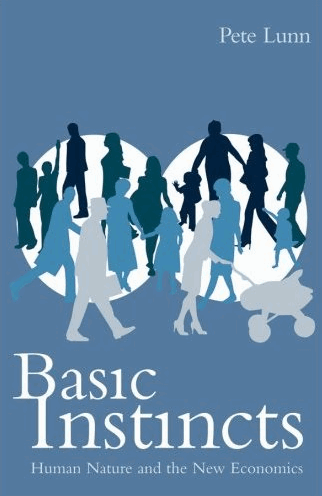Basic Instincts:Human Nature and the New Economics
 |
Author: Pete Lunn |
Okay, I admit, ‘economics’ has never been a word to get me instantly excited. But if we have to be excited before we can give something our attention, we are little more (less?) than savages. Happily, Basic Instincts and the New Economics really is exciting, as well as valuable. And right now economics is at the forefront of millions of minds.
Lunn was a neuroscientist and a journalist before he took up economics, and so is a real ‘outsider’ in the field. This gives him an interesting slant.
The essential message of his book is that the standard economic theories about how markets work are simply wrong. They start from abstract models which predict how people (who are assumed to be totally rational creatures) ‘should’ behave, and their numbers are based on the presumption that people do behave in accordance with the theories. But the new behavioural economics which Lunn espouses looks at how people actually behave when making decisions, and applies this knowledge to what happens in economics. Instead of starting from mathematical formulae, it starts with research into behavioural psychology. And this throws up a quite different picture of reality.
Lunn labels the standard view of economics ‘Marketopia’. ‘Marketopia’ assumes people are always rational, always selfish and always fully aware of all buying and selling options available to them. In contrast, Lunn demonstrates (with fascinating nuggets from the psychological research in the field) that people’s real life buying decisions are largely irrational. For example, we place a much higher value on something we own, or that is already familiar, than on something we don’t own or is less familiar – even if the objective value is identical. In addition, people’s buying decisions are quite often surprisingly selfless rather than selfish, and even more often limited by incomplete information. Human beings simply don’t behave as economists say they do.
This new take on how and why people buy and sell is fascinating in itself, and will make you stop and think before you make your very next buying decision. But it is also a wonderfully clear illustration of the traps that ‘protectionism’ of ideas can lead you into. In their efforts to shore up their theories, the economists have often had to construct more and more elaborate and contorted ‘explanations’ of how it all works – when really they should have been open-minded enough to see that the old presumptions were just wrong, and start afresh.
As I was reading this I could not help being reminded of the old ‘geocentric’ model of the universe which maintained that the sun and everything else revolved around the earth. This was the starting assumption. All new observational data somehow had to be made to fit with this ‘truth’. This required huge amounts of effort from gifted and intelligent scientists to elaborate their theories further to take account of all the anomalies they saw, and protect the ‘truth’. Lunn himself draws the same comparison.
The prose is lively, fast moving and witty. Because politicians so often listen to economic theorists when implementing policy, this book is both timely and extremely relevant.








